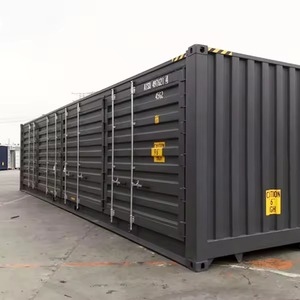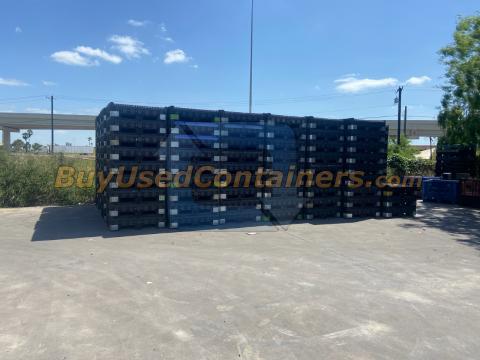Maximize your warehouse space with used collapsible bulk containers for streamlined handling
Wiki Article
Why Mass Containers Are Necessary for Sustainable and Cost-Effective Transport
Bulk containers play an essential function in modern-day logistics. They promote the effective movement of huge amounts of products, therefore maximizing transportation processes. This technique not just decreases expenses however additionally decreases environmental influence through lower exhausts and waste generation. As markets look for more sustainable practices, the adoption of mass containers is coming to be increasingly considerable. What ramifications does this shift hold for future logistics and supply chain management?
The Benefits of Making Use Of Mass Containers in Logistics
Bulk containers transform logistics by improving performance and sustainability. These containers permit the transport of large quantities of items in a single journey, significantly reducing the number of trips called for. This not only improves procedures yet also reduces labor expenses connected with handling, filling, and unloading. On top of that, bulk containers are made to maximize space usage within transportation automobiles, ensuring that more products can be shipped all at once.The standardization of mass containers also simplifies the logistics process. With consistent measurements, they can be quickly piled and saved, bring about boosted storage facility administration. Furthermore, bulk containers frequently include long lasting materials that secure contents from damages during transportation, therefore decreasing item loss and increasing total integrity. Therefore, companies can experience enhanced supply chain performance, inevitably bring about boosted profitability and consumer complete satisfaction. This combination of factors makes mass containers a crucial asset in contemporary logistics.
Environmental Influence: Lowering Waste and Carbon Impact
As markets significantly prioritize sustainability, the adoption of mass containers has arised as an essential strategy for lowering waste and reducing carbon impacts. These containers minimize using product packaging materials, such as boxes and plastic, thus significantly lowering overall waste generation. By settling shipments, mass containers enhance transportation efficiency, permitting for more items to be carried per trip. This decrease in trips straight associates with lower greenhouse gas emissions, contributing to a smaller sized carbon footprint.Bulk containers can frequently be recycled or reused, further mitigating ecological influence. The toughness of these containers assurances they can endure several transport cycles, decreasing the demand for single-use alternatives. used collapsible containers. By improving logistics and promoting effective resource usage, mass containers not just sustain sustainable methods however also encourage industries to line up with worldwide environmental goals. Eventually, their implementation shows a commitment to eco-friendly stewardship and responsible source management
Expense Savings: Exactly How Bulk Containers Lower Transportation Costs
While lots of firms look for means to enhance their bottom line, the use of bulk containers presents a substantial possibility for decreasing transportation expenses. Bulk containers make the most of the volume of items transported, allowing organizations to deliver bigger amounts at the same time. This performance reduces the number of journeys required, directly decreasing fuel expenses and decreasing labor expenditures related to loading and dumping.Furthermore, bulk containers frequently feature streamlined layouts that enhance area application within transport cars. This indicates less empty areas, resulting in much more effective usage of offered capacity. The longevity of mass containers can decrease the danger of item damages during transportation, making sure and reducing losses that more goods arrive undamaged.
Enhancing Supply Chain Efficiency With Bulk Storage Space Solutions
Bulk storage space solutions play a vital role in improving supply chain performance by enhancing stock administration. By consolidating items into fewer, bigger containers, companies can significantly lower dealing with prices connected with constant transfers and processing. This streamlined strategy enables for much better monitoring and management of stock, inevitably leading to enhanced operational efficiency.Structured Supply Management
Effective stock administration is essential for maximizing supply chain procedures, specifically when companies take on bulk storage remedies. These remedies make it possible for services to maintain higher stock degrees while minimizing the frequency of replenishment. By settling products right into mass containers, firms can enhance their inventory processes, lowering the intricacy related to tracking numerous smaller sized plans. This technique facilitates accurate inventory matters and boosts projecting precision, enabling for more enlightened decision-making. On top of that, mass storage space services streamline storage facility organization, making it easier to locate and accessibility items when needed. Consequently, companies can achieve a more reliable stock turn over rate, inevitably improving overall supply chain efficiency and minimizing the possibility of stockouts or overstock scenarios.
Reduced Handling Expenses
The application of mass storage options not only improves inventory administration however additionally substantially reduces handling expenses throughout the supply chain. By settling products right into bulk containers, firms lessen the demand for frequent handling and transfer between different storage and transportation units. This strategy reduces down on labor expenses connected with loading, unloading, and relocating smaller sized plans. Furthermore, mass storage space lowers the regularity of shipments, leading to reduced transportation expenses and lowered gas intake. As a result, companies can maximize their logistics operations, allowing for a much more effective allowance of sources. Eventually, minimized handling prices add to improved total supply chain efficiency, promoting a setting that sustains both sustainability and economic feasibility.
Convenience of Bulk Containers Throughout Various Industries
Lots of sectors have distinct demands for transport and storage, bulk containers have actually arised as a versatile option that fulfills a wide variety of demands. These containers, varying from large containers to specialized containers, can accommodate diverse materials, consisting of powders, fluids, and granules. In the farming sector, bulk containers promote the transportation of grains and plant foods, while the food and beverage market utilizes them for active ingredients and completed items. The chemical industry depends on bulk containers for securely moving unsafe materials, ensuring compliance with safety and security laws. In addition, building companies take advantage of bulk containers for carrying accumulations and various other materials. Their versatility encompasses numerous settings of transport, consisting of trucks, trains, and ships, enhancing logistical effectiveness. This adaptability not only enhances operations across different sectors but additionally promotes sustainability by reducing product packaging waste and maximizing area en route. Mass containers play a crucial role in contemporary supply chain management.Future Fads in Bulk Container Usage and Sustainability
The future of bulk container usage is significantly formed by innovative products advancement that boosts sustainability. Additionally, automation in logistics assures to enhance procedures, decreasing waste and enhancing performance. Embracing round economic situation methods will additionally revolutionize just how bulk containers are created, used, and reused, fostering a much more sustainable transport landscape.Cutting-edge Products Advancement
As markets significantly prioritize sustainability, ingenious materials advancement wholesale containers becomes a considerable element in improving green transportation options. Makers and researchers are checking out eco-friendly plastics, recycled composites, and lightweight steels to reduce environmental influence. These products not just minimize waste however additionally improve fuel effectiveness by lowering the overall weight of containers. Furthermore, innovations in smart materials, which can adjust to differing problems, boost the longevity and functionality of bulk containers. The combination of these innovative materials lines up with round economic situation concepts, advertising reuse and recycling. As the need for why not try here lasting techniques expands, the development of such products will play an important function fit the future of mass container usage in logistics and transportation.Automation in Logistics
Considerable improvements in automation are poised to change logistics and the application of mass containers, improving sustainability in transportation. Automated systems, consisting of drones and autonomous cars, are simplifying the movement of bulk containers, minimizing the dependence on traditional fuel-powered transport. These technologies optimize routing and filling procedures, boosting and decreasing vacant miles fuel effectiveness. Furthermore, automated inventory management systems boost tracking and surveillance of bulk containers, making sure much better resource allocation and lowered waste. The assimilation of the Web of Things (IoT) enables real-time data evaluation, making it possible for proactive decision-making that aligns with sustainability goals. As automation remains to progress, it is expected to drive further developments in bulk container use, eventually sustaining even more sustainable logistics methods and decreasing the environmental impact of transport.Circular Economy Practices
Innovations in automation are setting the stage for a more integrated strategy to circular economic situation methods in the domain name of bulk container use. As industries significantly embrace sustainability, mass containers are being designed for durability and reusability. This shift not just minimizes waste but also boosts source effectiveness. Business are adopting methods such as closed-loop systems, where used containers are accumulated, refurbished, and reestablished into the supply chain. Furthermore, smart innovations track container life cycles, facilitating far better management and minimizing ecological impact. The cooperation between producers, logistics service providers, and end-users is crucial in developing standards for lasting container usage. refurbished bulk containers. Future fads indicate a growing emphasis on products that are recyclable and biodegradable, more enhancing the round economy's concepts in bulk transportation
Frequently Asked Concerns
What Products Are Bulk Containers Usually Made From?
Bulk containers are generally built from long lasting products such as high-density polyethylene, steel, aluminum, and cardboard. These materials provide protection, flexibility, and toughness, making them appropriate for moving various goods in different markets successfully.Just how Do I Choose the Right Size Bulk Container?
Selecting the ideal dimension mass container includes reviewing the volume of materials to be transported, thinking about taking care of equipment compatibility, and assessing storage space demands. Correct dimension guarantees efficiency in transport and decreases waste during shipment.Are Bulk Containers Reusable or Recyclable?
Mass containers are typically reusable, developed for several journeys, boosting sustainability. Several can additionally be recycled, depending on the materials used. Selecting recyclable choices further supports environmental goals and decreases waste in transport practices.What Security Rules Relate To Bulk Container Transportation?
Safety and security laws for mass container transportation include conformity with the Division of Transportation guidelines, appropriate labeling of harmful materials, architectural stability analyses, and adherence to weight restrictions to guarantee secure handling and prevent mishaps during transportation.Exactly How Can Companies Change to Utilizing Mass Containers Properly?
Businesses can alter to bulk containers by reviewing current logistics, educating personnel on handling, buying appropriate equipment, enhancing stock management, and teaming up with vendors to ensure compatibility and efficiency throughout the supply chain.
As markets significantly prioritize sustainability, the fostering of mass containers has emerged as a key approach for minimizing waste and reducing carbon impacts. By combining products into site web mass containers, firms can improve their supply procedures, decreasing the intricacy associated with tracking several smaller sized packages. As markets increasingly focus on sustainability, ingenious products development in mass containers emerges as a substantial element in improving environmentally friendly transport solutions. Automated systems, including drones and independent cars, are simplifying the activity of bulk containers, decreasing the dependence on typical fuel-powered transport. Furthermore, automated stock monitoring systems boost tracking and tracking of mass containers, making certain click for source better resource appropriation and decreased waste.
Report this wiki page